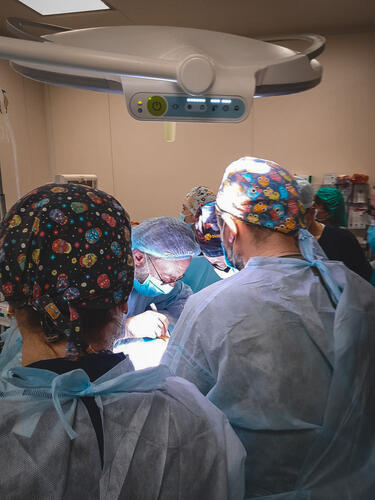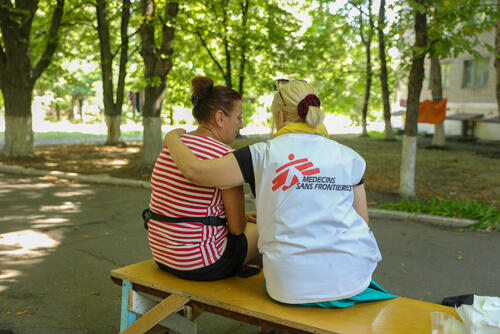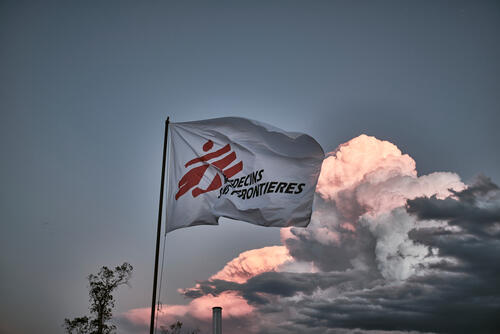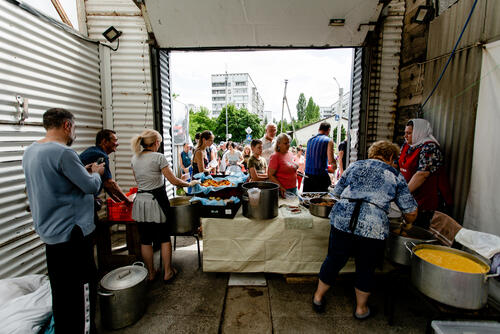Staff in the 750-bed Okhmatdyt paediatric hospital, one of the largest in central Kyiv, Ukraine, have received training and advice on mass casualty influxes (a large number of trauma patients arriving at the same time) from a visiting surgical team from Médecins Sans Frontières (MSF). The training, held on Sunday 13 and Monday 14 March, included an MSF surgeon with war surgery experience who also assisted in the operating theatre, and gave advice to the surgeons about approaches to war-trauma surgery.
“Our surgeon did one quite delicate operation, and straight afterwards the surgeons in the hospital came and proactively asked to be trained on those techniques,” says Anja Wolz, MSF Emergency Coordinator in Ukraine. “Most of the surgeons in this hospital are specialists, but they do not have trauma surgeons.”
“So, they have not had experience doing significant debridement [wound cleaning] which is essential for bullet and shrapnel wounds,” says Wolz. “If a bullet or shrapnel wound is not dealt with quickly or correctly, infection can set in fast and it requires some experience to know how to approach this type of surgery - to ensure the wound is effectively cleaned and will heal properly, and to avoid further infection.”

With curfews, frequent bomb-alert sirens and staff sheltering in bunkers, in addition to difficulties in travelling to the hospital, the usual number of 2,000 personnel has reduced to a core team of around 200. The hospital has discharged, or referred elsewhere, most of the former patients and the staffing levels feel okay for the moment, given that the hospital is setting itself up to be ready for treatment of people with trauma wounds.
At the time of our team’s visit, the hospital was receiving several wounded patients per day. Expecting the numbers of wounded to increase, the staff was keen to benefit from our war-medicine experience to be better prepared in several ways:
- Mass casualty events: The hospital staff wanted to sharpen their plans for triage and organisation in the event of the simultaneous arrival of multiple trauma patients – otherwise known as a Mass Casualty Plan (MCP). MSF’s conflict-experienced emergency room doctor provided classroom training on best practices for mass casualty plans for 40 of the hospital’s staff. Our team advised on changes to the patient-flow circuits in the hospital in the event of large numbers of casualties.
- Trauma-surgery: The surgeons in the hospital are mostly specialised, so our conflict-experienced vascular surgeon provided training to hone skills in rapid lifesaving trauma stabilisation and surgery. These included removal of bullets or shrapnel, preventing internal bleeding, effective wound cleaning and other core essentials of trauma surgery. This was done via hands-on training while assisting in the operating theatre.
- Supplies: The hospital requested advice on how to manage their supply lines and organisation of the basic essentials to be able to manage high numbers of war-wounded patients over an extended period. The MSF team assessed the quantities of supplies the hospital have, and made recommendations about continued supply of war-trauma essentials.
We would also like to do more hands-on training and give advice for the surgeons – practical bedside and operating theatre training.Anja Wolz, MSF Emergency Coordinator
“We intend, if possible, to return soon to build on what we could do in the first short visit,” says Wolz. “We have not been able to fully finalise the mass casualty training and there is more to do to help map out the best patient pathways in case of simultaneous arrival of large numbers of casualties.”
“We also want to continue looking into the hospital’s supply chains,” continues Wolz. “These are some of the principal things that the hospital has asked for. We would also like to do more hands-on training and give advice for the surgeons – practical bedside and operating theatre training.”





